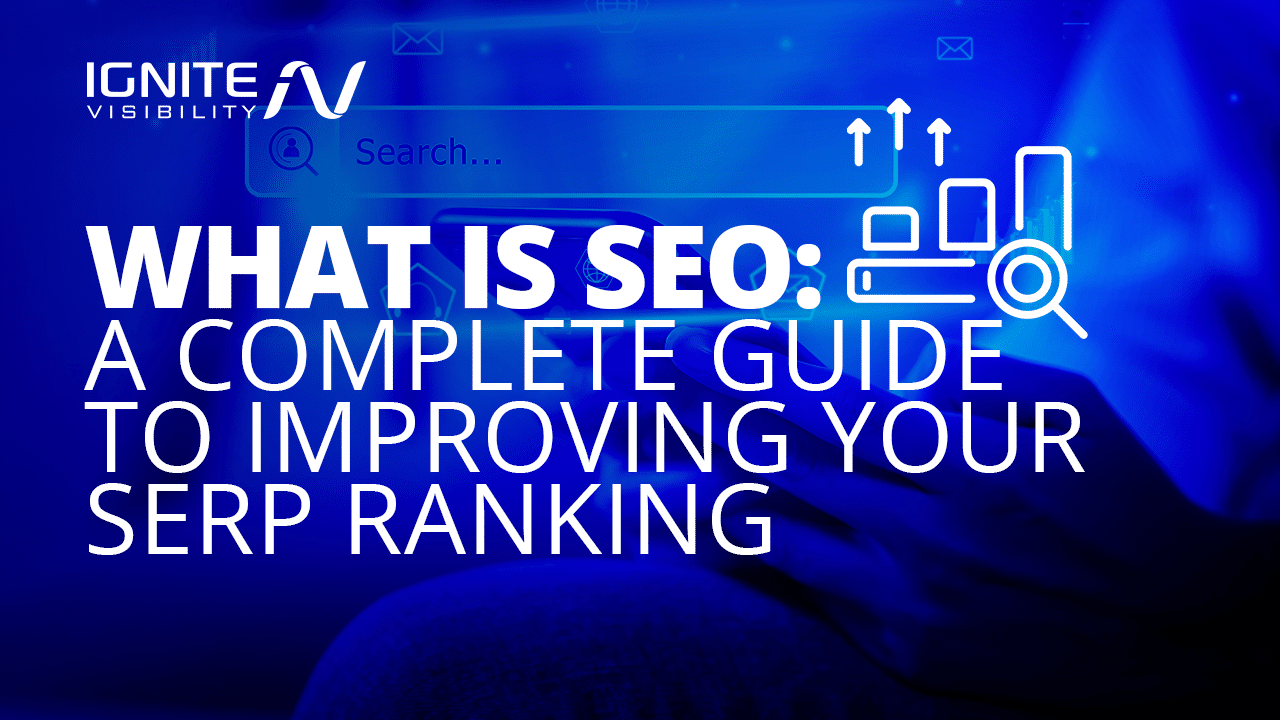
What We’ll Cover:
- What is SEO: The Basics
- Why SEO Matters
- On-Page vs. Off-Page SEO
- The SEO Evolution (From Black Hat to White Hat)
- Google Algorithm Updates and SEO
- Inside Search Engines and How They Rank
- Content and SEO
- Link Building and SEO
- Authority, Trustworthiness, and SEO
- Social Media and SEO
- What is SEO: A Quick Guide to Optimization
- Frequently Asked Questions
What is SEO: The Basics
SEO is the process of optimizing material—whether it’s content on your website, a social media post, or a video you produced—for search engines.
All of this optimization is done organically, which means the traffic you get from your optimization efforts is free.
This is an important distinction. If you’ve had much interaction with search engine results pages (SERPs), which, realistically speaking, you absolutely have, then you know the SERPs are separated into organic and paid results.
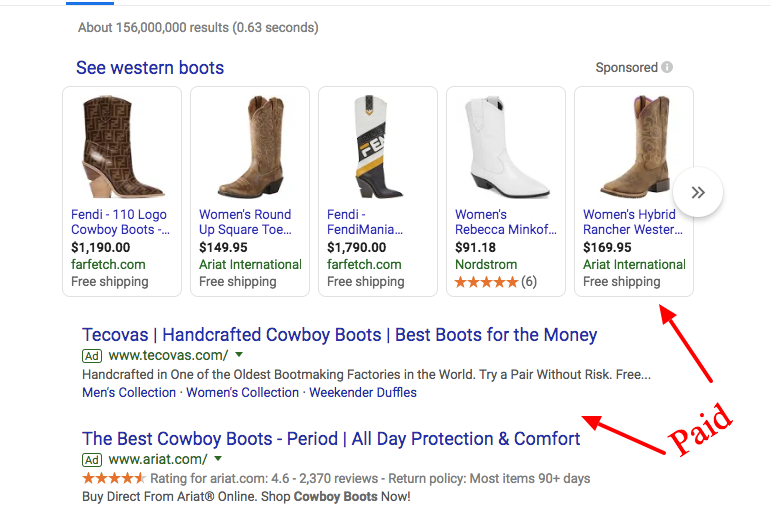
What is SEO: paid results
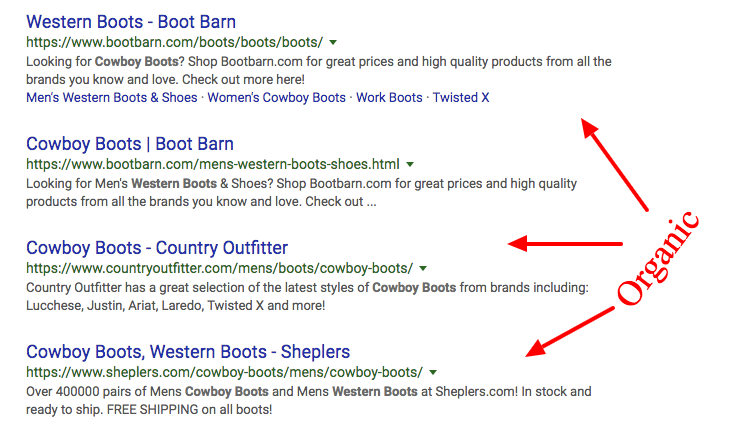
What is SEO: organic results
With SEO, we’re going for organic. These are based entirely on your own efforts, and how well each search engine thinks your content matches a specific search query. There is no money changing hands here, and paying doesn’t rank you higher in the organic results.
All of your major search engines like Google, Bing, and Yahoo rank websites and content according to their own optimization algorithms.
They do so by using “spiders” to crawl your site, finding optimized pages, and adding them to their index. Then, when people perform searches, Google uses that index to find the most relevant piece of content for the given search query.
Paid results, on the other hand, exist outside of organic results. Their positions are paid for, not optimized for, and they generally appear at the very top of the results page. These fall under the SEM, rather than the SEO, category.
While you aren’t paying for your SERP position with organic SEO work, there may still be some costs involved. Some things to consider include the cost of creating valuable content, software to help with keyword research, SEO project management, or hiring an outside agency to handle your SEO work.
What is SEO: Why SEO Matters
SEO matters because your organic results rely entirely on your SERP ranking. You want that top spot. If you have a low SERP rank, the chances that people will ever even see your page are pretty slim.
Search engines, like Google or Yahoo, could make or break your site. This is where people turn when they need answers, information, or just to kill time.
And because they’re used so often, so many people use them, they’re a huge source of traffic for the majority of websites.
According to Growth Badger, search engines drive over 50% of organic web traffic. In some industries, such as health and medical, travel, or design and development, that figure is closer to 70-90% of all traffic.
In fact, Google is responsible for 8 times more traffic than every social media network combined. Think of that when you’re pouring time, energy, and money into your social media marketing. Maybe some of that cash would be better spent focusing on improving your SEO.
Not surprisingly, the number one position on a SERP gets the most traffic. Here is a breakdown of the click-through rate (CTR) of the top ten positions, according to data from Backlinko.com:
- Position 1 – 27.6%
- Position 2 – 15.8%
- Position 3 – 11.0%
- Position 4 – 8.4%
- Position 5 – 6.3%
- Position 6 – 4.9%
- Position 7 – 3.9%
- Position 8 – 3.3%
- Position 9 – 2.7%
- Position 10 – 2.4%
Generally, users don’t want to scroll through pages of results. They want the best answer, at the very top of the page. Your best chance of snagging some quality organic traffic from a SERP is to get into that number 1 position.
Luckily, Google’s pretty good at delivering just that. But whoever claims that spot has to put in the work to get it.
This is where quality SEO work comes into play. Without it, you’ll never get to that top spot.
Making it to the first page isn’t good enough. If you aren’t in the first three spots, you’re risking losing that traffic.
Sounds harsh, I know. But keep in mind–SEO is a long-haul game. Your site probably won’t rank on the first pages initially, but if you keep optimizing and improving it, you’ll keep creeping up in the rankings.
On-Page SEO vs. Off-Page SEO
When it comes to SEO, there are two different categories that your tasks can fall into: on-page and off-page.
On-Page SEO
On-page SEO consists of all the work you can control, such as the content, images, keyword usage, meta tags, meta descriptions, and alt tags. These things play a big part in helping search engines crawl your page and index it properly.
The best part about on-page SEO is that you control it. All of the work you do here will pay off in a visible and tangible way.
Here is a good list to review when optimizing your on-page SEO:
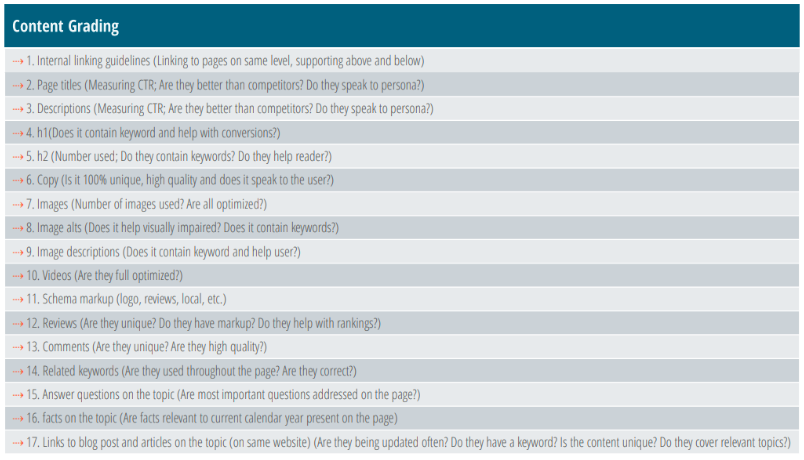
What is SEO: On-page SEO checklist
Off-Page SEO
Off-page SEO consists of all the optimization techniques that take place outside of your website. Things like backlinks, social media marketing, and guest blogging are examples of off-page SEO.
Off-page SEO differs from on-page SEO in that, while you can work on it, you can’t directly control it. Much of it relies on other people, companies, and websites.
For example, business directory submissions, forum signatures, and guest blogs are all great ways to build up your backlinks. However, if the owner of the original website deletes your links, there isn’t much you can do other than move on to another site.
Some off-page SEO has a negative impact on your SERP ranking. This includes things like bad links. If Google suspects your site is spam because of spammy backlinks, it can tank your SERP ranking. You’ll want to keep an eye out for bad backlinks and do whatever you can to remove them when they pop up.
Off-page SEO is really all about building genuine relationships with other people. When media outlets, educational institutions, or other websites enjoy your content, they will be more likely to share it organically, providing you with quality backlinks. Google likes these types of links more than link exchanges or other spammy techniques.
The SEO Evolution: Moving From Black Hat to White Hat
SEO requires a quality strategy and honest relationship building, but it wasn’t always that way.
Let’s take a look at where SEO originated.
It may be hard to imagine a life without the internet but websites themselves are fairly young. The first site was created in 1991. In fact, it’s still live today!
Back then, and throughout most of the early ’90s, there wasn’t much competition, meaning there wasn’t much need for SEO.
But as more and more people started using the web, more sites popped up. With more competition, it became harder to navigate them all. This is when search engines were born. The first was Yahoo in 1994 with Google following shortly after in 1997.
Once robots started indexing sites, there became a need for sites to make themselves stand out. This is where SEO comes in.
Before all the complex rules and strategies we know today, SEO was fairly simple. There were few rules and far fewer ramifications for spammy sites.
That lack of rules created a “wild west” attitude that quickly gave rise to Black Hat SEO–the practice of using spammy tactics against search engine guidelines to improve rankings.
Black Hat SEO includes things like keyword stuffing, hidden text or links, guest posting networks, spammy backlinks, link farms, and creating domains with duplicate content. All things that are frowned upon today.
Back in the day, these kinds of tactics often guaranteed a site would skyrocket to the top of the search results. But eventually, search engines caught on.
If search engines wanted to provide their users with the quality content they were looking for, they needed to refine their indexing strategies.
This led to them weeding out any websites that relied on Black Hat SEO to get noticed. Quality websites would put the work in to differentiate themselves from spam. They wanted genuine readers, not just quick clicks.
This led to the birth of White Hat SEO. Websites who want to be recognized for their quality content include White Hat SEO in their strategy, including creating valuable content that builds a site’s authority and integrity.
The goal of a White Hat strategy is to get your site visitors to return again and again and to prove to Google that you are a trustworthy and reputable source. This will organically push your site up the SERP rankings to the coveted top spot.
If you’re interested in diving into the evolution of SEO even further, check out SEO: The Movie.
How Google Algorithm Updates Affect SEO
To combat Black Hat SEO, Google introduced several updates to its algorithm. Since the search engine giant quickly established itself as the go-to site, its changes affected the internet entirely.
As more and more sites are created, Google is finding reason to update its algorithms more often than it used to.
-
- February 2011- Panda: This one was major and targeted low-quality, thin content. Panda ultimately impacted 12% of rankings. It was a game-changer as far as how we produce content today.
- April 2012 – Penguin: This update targeted irrelevant or spammy links and made the inclusion of high-quality, relevant backlinks an important part of SEO.
- April 2013 – Hummingbird: When this update was introduced, it penalized sites for keyword stuffing and low-quality content. It helps Google better interpret search queries and searcher intent.
- October 2015 – RankBrain: This update to Google’s machine learning system became one of its most important ranking factors. It made optimizing for relevancy and related concepts an important part of SEO.
- March 2017 – Fred: This update penalized thin content and spoke to the growing importance of comprehensive content in SEO.
- August 2018 – Medic: While this update wasn’t necessarily aimed at medical sites, a number of them dropped in the rankings. The goal behind this update was to better match results to searchers’ intents and protect them from misinformation.
- October 2019 – BERT: This machine learning algorithm affected one in ten searches, making it one of the biggest SEO changes in recent history. It uses context clues to interpret a search query and its intent.
- June 2021 – Page Experience Update: This newer algorithm update rolled out gradually throughout 2021. It combined existing experience signals with Core Web Vitals to create a more holistic perspective.
- 2022 – MUM (Multitask United Model): Coming soon, this update is expected to make huge waves in the world of SEO. It will combine information from a variety of sources to deliver better results. It can read, understand, and learn over 75 languages, making it one of the most robust updates yet.
As you can see, Google loves to switch up how its algorithms work. This is why it is important to stay up-to-date on the latest SEO tricks.
Inside Search Engines and How They Rank
Google’s algorithm is constantly evolving and, as of today, it has over 200 factors it uses to determine a website’s rank.
While all of them are important, there are a few that you should focus the majority of your attention on. These include:
- Referring domains
- Domain authority
- Mobile usability
- Dwell time
- Organic click-through rate
- Total number of backlinks
- Content quality
- On-page SEO
When working on optimizing your website, focus on these eight factors first, as they make the most difference in your ranking.
Content and SEO
When SEO first entered the game, low-quality, thin content was good enough to get you on the first page. Now, it’ll be the first thing to get you marked as spam.
Google wants to refer its users to quality content that provides the answers to their questions. To do this, they are going to be sure to return pages that they deem relevant, authoritative, and trustworthy.
When you’re creating content, be sure that it’s as in-depth as possible. You want to pack it with plenty of useful information, without stuffing it full of keywords.
This is why producing long-form content is so important. Generally, anything over 1,500 words is seen as more comprehensive and more likely to address a topic completely, and, therefore, often ranks higher than shorter pieces.
In addition to length, there’s an emphasis on natural language. The days of stuffing your content with keywords in inappropriate places are gone.
Google is all about finding the most relevant answer to a search query, and as its capabilities expand, it’s able to recognize more subtleties in content. It no longer just focuses on blatant keywords.
For marketers, that means focusing on producing content optimized for the reader, not the search engine.
Link Building and SEO
Link building has been an important SEO factor since the beginning.
But as we know from recent algorithm updates, Google is constantly getting better at spotting the differences between high-quality links from low-quality.
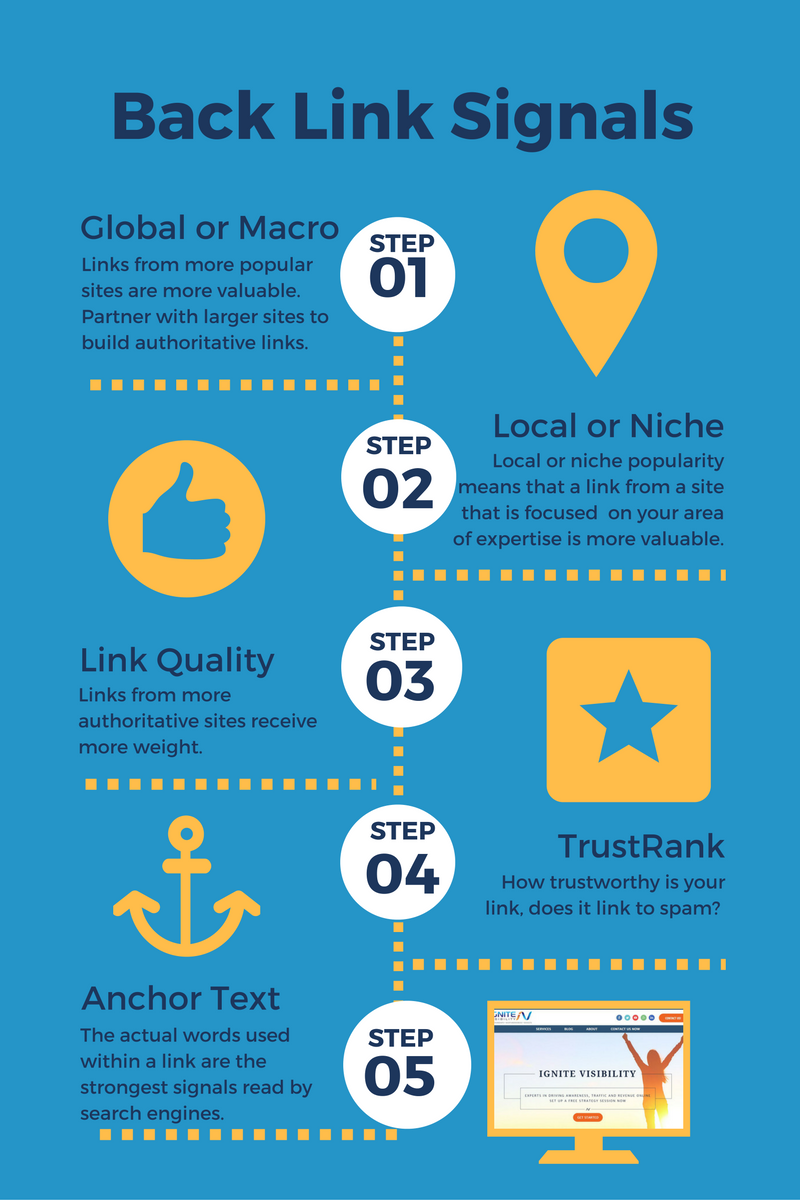
What is SEO: Backlink signals
In Google’s eyes, a link to your content counts as a vote. If it’s from a site with a poor reputation and domain authority, that vote could count against you. Rather than focusing on those sites, focus your attention on high-quality and reputable sites. Those votes will count in your favor.
The more votes you have in your favor, the more trustworthy Google will view your site. And the more trustworthy it is, the more likely Google is to rank it well for related queries.
To get these links, you need a quality link-building strategy.
The best way to get backlinks is to respond to journalist inquiries. HARO, or Help a Reporter Out, is a great online database to find inquiries that apply to your expertise.
Unlinked mentions, industry studies, and award announcements are all beneficial when it comes to snagging quality backlinks.
Authority, Trustworthiness, and SEO
The better your content, the more authoritative it will appear, and the better your links, the more trustworthy.
With the Medic update, even more emphasis seems to have been placed on these factors, especially if you operate a site that deals with sensitive or highly academic information (think sites that give financial or medical advice).
Now is the time to get familiar with two important concepts: YMYL and EAT.
YMYL
YMYL stands for Your Money Your Life. It refers to any website that includes content that can affect a person’s health, happiness, safety, or financial stability. YMYL websites are judged more critically than other websites because of the potential they have to make a difference in the general public.
YMYL sites were thrown into the spotlight after the Medic update. With these types of sites, Google only wants to return the ones that are trustworthy to their users. This is especially true for the topics of health, e-commerce, finance, and business. These types of sites took the brunt of the beating after the Medic update.
EAT
EAT is another important concept to understand. EAT stands for expertise, authority, and trustworthiness. When indexing your site, Google is going to look at how well you score on the EAT scale.
- Expertise – is the author an expert on the subject they are writing about?
- Authority – do other people recognize the author as an expert on the subject?
- Trustworthiness – is the information provided true and accurate?
The more you can show that you are an authority in your field, the better EAT will help to boost your SERP rank.
Social Media and SEO
Everyone wants to know what effect social media will have on their search rankings.
The thing that people forget, though, is that social media itself is not a ranking factor.
It does, however, affect your rankings indirectly. More specifically, any links you get from social media do have an effect.
According to Search Engine Journal, social media can positively influence SEO by boosting your content performance, increasing your amount of quality backlinks, and working to bring more traffic to your website.
People are spending more time than ever on social media platforms. If you can pull that traffic from your social media page to your website, it will help Google see you are a popular and trusted site.
Your social media is also a great place to build solid relationships and a level of trust with your audience, which also helps build your brand authority.
What is SEO: A Quick Guide to Optimization
When it comes to digital marketing, SEO is everything. Keeping up with the ever-evolving Google algorithm updates is the best way to stay on the top of your SEO game.
Once you’re familiar with the newest algorithm rules, perform an SEO audit on your site. Look at your on-page SEO. How is your current content helping or harming your SERP rank?
Once you’ve looked at your existing content, consider ways to improve it. Do research to find out what keywords are performing well in your niche. Find ways to naturally insert them into your existing content or create new content that focuses on them.
Don’t forget about your off-page SEO! Check out your backlinks and remove the ones that are not positively benefitting your rank.
The most important thing to remember is that you want to produce quality content for your reader, not necessarily the search engine. When your readers are thrilled with your content, the search engines will be, too.
Wrapping Up
It can be overwhelming when first starting out as a new digital marketer in the world of SEO. Try not to get discouraged. It is important to remember that SEO is a large umbrella of strategies that you can use to boost your organic traffic.
Don’t bite off more than you can chew. Start with small steps that you can handle and then add onto your strategy when you feel more confident.
Most importantly, remember that SEO is a long game. You aren’t going to become an expert overnight.
Take your time and really learn the ins and outs of SEO and digital marketing. Your page will start jumping up the SERP before you know it!
Frequently Asked Questions
1. What is SEO?
SEO, or search engine optimization, is the process of optimizing your online content so it has a better chance of being discovered through a search engine’s organic search results.
2. What is SEO in digital marketing?
SEO is the best way to boost organic traffic to your website. Traffic is key to being successful in digital marketing. The more people who land on your site, the better.
3. How do you do SEO?
Important SEO ranking factors include having a secure website, a strong brand presence, a positive user experience, and engaging content. You also want to make sure you’re driving links to important pages so you can grow your overall website authority.
4. How does SEO work?
SEO optimizes your page to improve your SERP ranking to increase your organic traffic and conversion rates.
5. What are the types of SEO?
There are a variety of types of SEO, including local SEO, international SEO, general content marketing SEO, and e-commerce SEO.
6. How do you improve SEO?
To improve your SEO efforts, focus on building your authority in your field by creating quality content written for the users’ benefit.
7. What is an SEO audit?
An SEO audit is an evaluation of your website. Typically, an SEO professional will analyze your search engine friendliness and make suggestions for improvement.
8. What is SEO consulting?
SEO consultants tell you what steps you need to take to boost your SEO both online and offline.
9. What is SEO content?
The type of content you create on a blog, home page, product page, category page, and service page are all reviewed by Google according to their intent, keywords, and authority. Google will then rank your website higher or lower accordingly.
SEO content is specific content formulated in an exact way so users can more easily find you on search engines.
10. What is SEO copywriting?
An SEO copywriter uses SEO strategies to craft copy that helps increase a website’s search engine ranking.
11. What is SEO blogging?
This is the practice of optimizing your blog’s content and site architecture for search engines.
12. How much does SEO cost?
Unlike paid media, there isn’t a general set cost because SEO costs depend on various factors. Generally speaking, you can expect to pay between $5,000 and $15,000 per month if you are running a medium-sized website that produces between $5 million and $1 billion in revenue per year.
13. What is local SEO?
Local SEO is a branch of SEO that refers to the process of getting an HTML page ranked within a city and the Google My Business page ranked inside of the maps.
This is important because some businesses have hundreds or thousands of locations and local SEO allows each location to target local customers.
14. How do you find keywords for SEO?
You can use tools like the Google Keyword Planner, Google Search Console report, Bing Webmaster Tools report, SEMrush, and SpyFu to find keywords.
15. What are SEO tools?
Some of the most popular SEO tools include Moz, SEMrush, Google Search Console, Screaming Frog, and Pitchbox.
16. What is a SEO service?
This is a service offered by an SEO agency that handles all activities related to SEO, including reporting, SEO dashboards, recommendations, link-building, and content creation.
17. Is SEO dead?
Absolutely not. In fact, SEO is one of the most important digital marketing channels out there.
18. How can you become an SEO expert?
SEO takes time and practice. Subscribe to digital marketing blogs such as this one or take advantage of online classes and workshops to sharpen your SEO knowledge.